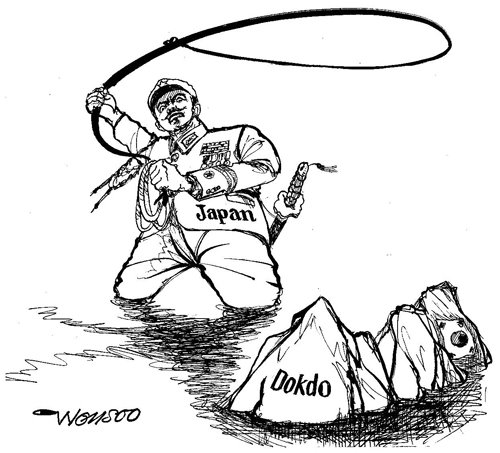
Outrageous. Sensational. Emotional. Absurd. Welcome to the world of Korean journalism.
I was recently browsing article on the Korea Times when I came across this one. The title is, “Lee, Bush to Discuss Dokdo.” Beneath the article are a variety of comments, left by the readers. I found this brave comment quite humorous:
darius (58.143.217.193) 07-29-2008 22:03
Iraq, Afghanistan, Election year, Dokdo, Subprime crisis, Iran nuclear program. Find the issue that no American cares about.
His point was concise and it hit the nail on the head. Everyday I open a Korean newspaper or browse the online sites, scouring for the latest world events. Beef takes precedence over a South Korean civilian who was ruthlessly gunned down by a North Korea soldier. Similarly, the ridiculous controversy over the Takeshima/Liancourt Rocks/Dokdo islands (depending on who you talk to) has overshadowed South Korea’s dire economic and energy crisis. Opening a South Korean newspaper is similar to opening a new comic book or science fiction magazine. You’re excited because you don’t know what kind of unexpected things you will read about. South Korea has a number of shoddy journalistic ethics to thank for that!
However, I digress. The U.S. Board on Geographic Names (BGN) recently altered its information concerning Takeshima/Dokdo (the islets currently disputed by Japan and South Korea). The BGN changed the official name of the islets to the “Liancourt Rocks” and have listed them as having “undesignated sovereignty.” This was to reflect a change in the official BGN database to reflect the American government’s neutral position on the entire controversy. Koreans, however, view the entire fiasco as a diplomatic loss to Japan.
So, now, President Lee is going to “discuss” Dokdo with Bush. Seriously? You’re going to have an opportunity to talk with the most powerful man on Earth and you’re bringing the Dokdo islands to his table? It’s embarrassing, to say the least, but South Koreans seem to be blissfully unaware that their unorthodox diplomacy amounts to nothing more than a sophomoric attempt to stir controversy.
Another Korean journal, the Hankyoreh, was impetuous enough to publish an editorial suggesting that Japan and the U.S. were in cahoots and plotting against South Korea’s “sovereignty” over the disputed isles. An excerpt from the article reads:
. . . Even so, you have to wonder what the United States is truly up to lately since there is just no way it is unaware of the true nature of the Dokdo issue . . . The United States needs to explain in detail what decisions were made within the U.S. government about the territorial status of Dokdo that things like this have come to pass without any consultation with Korea, a U.S. ally. And of course the move will have to be set straight if the decision was an inappropriate one . . .
First of all, it’s ridiculous to even suggest that the United States is obligated to consult with South Korea on it’s neutral designation of disputed territory – within its own archives nonetheless. It gets better though:
Initially Dokdo was included among all the islands Japan was to surrender its rights over, but in the end the United States did not include mention of the islets in the treaty. That is what gives Japan the wiggle room to make provocations over territorial rights to them. Koreans wonder whether this move by the United States is an extension of that attitude from the past.
The treaty they refer to is the San Francisco treaty which forced Japan to abdicate its colonial possessions. Dokdo was not included on this treaty which technically means…Japan still legally owns the islets.
Japan’s provocations over Dokdo are in the same vein as its attempts to rationalize its history of imperialist aggression. We would hope that the United States would not create unnecessary factors for discord between our two countries with designations and comments about Dokdo that sympathize with such intentions on the part of Japan.
How does a neutral name designation for disputed territory sympathize with Japanese intentions in any way?
There has been an arguable lack of rationality concerning South Korean news coverage over the issues as well. Robert Koehler, a prominent blogger on Korea, stated:
JoongAng Ilbo editorial writer Lee Chul-ho scores an own goal by penning a column about Dokdo so absurd it makes anything Japan does short of invasion look rational by comparison.
The full article can be read here but for your convenience I’ve taken the time to quote the outrageous opening:
The number of Australian soldiers who sacrificed their lives during the Second World War exceeded 23,400, which is less than 10 percent of the total number of U.S. soldiers who fought and died during the war and just 1 percent of the overall death toll on Chinese soldiers. But Australia was most strict in dealing with Japanese war crimes, in contrast to the Tokyo War Crimes Tribunal, which was relatively soft by comparison.
What better way to make a point than by marginalizing the lives that were lost by American and Australian soldiers in the war against Japan? This is, literally, what passes for news in South Korea. At least South Korea hasn’t come around to making the wildly absurd statements that North Korea is known for. A news article from the associated press states that:
North Korea condemned Japan on Tuesday for laying claim to the islets, accusing Tokyo of attempting to “grab (Dokdo) at present and the whole of Korea in the future and, furthermore, re-invade the rest of Asia.”
Yep, South Korea has refrained from this kind of crazy rhetoric. But it’s close. Damn close.



